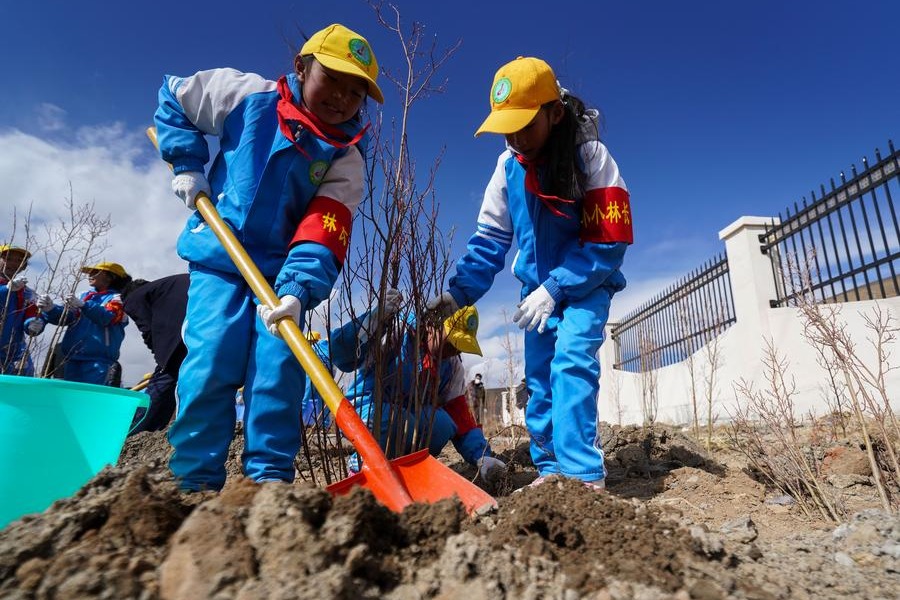China eases marriage registration with new rules

BEIJING -- At the stroke of midnight 15 days ago, Qiao Lei and Tang Xin logged on to secure a marriage registration slot for Saturday, the day China's new marriage registration rules took effect nationwide.
Just over 12 minutes after arriving at a registry office in Beijing, the couple emerged as newlyweds.
"The policy change made the process more convenient," said 33-year-old Tang. "It gives us more freedom to choose where to marry."
The updated regulations eliminate the need for household registration books, which have long been necessary for marriage applications. Couples from the mainland now need only present their identification cards and sign a declaration affirming they are unmarried and not close blood-relations within three generations.
Additionally, the new rules allow couples to register their marriage at any eligible registry office nationwide, regardless of their household registration location.
On Saturday morning, a woman who identified herself only as Zhu and her husband became the first couple in Southwest China's Yunnan province to register under the new rules. Originally from the southern province of Guangdong, the pair completed their marriage registration in Kunming city in just 15 minutes.
"We both live and work in Kunming. The convenience boosts our sense of belonging in this city," said Zhu.
The change also applies to couples with one partner who is a mainland resident and the other a foreign national or resident of Hong Kong, Macao or Taiwan, according to the Ministry of Civil Affairs.
These couples can now marry, divorce or apply for marriage certificate reissuance at any authorized registration office, regardless of the mainland partner's household registration location.
This regulation overhaul is part of China's broader push to streamline public services and ease the burdens of its citizens -- particularly for the increasing numbers of people living and working away from the place of their household registration.
National census data released in 2021 showed that nearly 500 million people in China were living away from their registered hometowns, with over 70 percent of this migrant population aged between 15 and 35.
"Education, employment, and other factors have led to large-scale migration," said Jiang Yue, a law professor at Xiamen University. "The revised marriage registration rules reflect that reality and aim to make basic public services more accessible."
The new rules -- the first major revision to China's marriage registration ordinance in more than two decades -- are seen as a significant step toward improving the country's civil affairs services.
The nationwide rollout of the regulations was preceded by local pilot programs aimed at streamlining marriage registration.
As early as 2021, Yunnan began testing the removal of registration location limits within city-level jurisdictions. By August 2023, the trial had expanded to include all counties and districts, according to provincial civil affairs authorities.
Technological advances have helped make such reforms possible. In 2016, China's Ministry of Public Security launched a system designed to verify identity consistency, detect expired IDs, and prevent issues like identity theft or misuse.
Jiang noted that with advancements in information technology, marriage agencies can now access real-time data on marital status and household registration.
The reform comes at a time of continued decline in marriage registrations in the country. Official data show that 1.81 million couples registered their marriages in the first quarter of 2025, down 8 percent year on year. After a brief rebound in 2023, registrations fell again last year to their lowest level since 1980.
"In recent years, young people's views on marriage and childbirth have been shifting," said demographics scholar He Yafu, adding that while long-term change will depend on addressing broader social factors, the new rules could help reverse the decline partially.
- Speaker of Zimbabwe parliament to visit China
- University punishes professor and daughter for academic misconduct
- Chinese PLA honor guard joins Minsk parade marking 80th anniversary of victory in Soviet Union's Great Patriotic War
- Xi leaves Moscow after state visit to Russia, attending Victory Day celebrations
- China eases marriage registration with new rules
- 2025 World Digital Education Conference to unveil smart education white paper





































